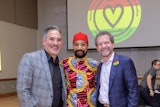Someone unfamiliar with his work, accolades or age could easily mistake M.K. Asante, Jr. for a college student instead of a university professor. Asante’s mesh brim hat, a constant fixture in his attire, bright smile and casual demeanor radiate youth while his knowledge of film, literature and African-American history could rival that of scholars twice his age.
Asante, an awarding-winning poet, author and internationally acclaimed filmmaker, recently embarked on his most ambitious teaching assignment to date: educating the world about Kwanzaa.
Sitting comfortably behind his desk at his Morgan State University office, the 26-yearold professor subtly announces the motto he lives his life by and the rationale for his latest film: “If you make an observation, you have an obligation.”
Two years ago during the 40th anniversary of Kwanzaa, Asante noticed there were no films that accurately depicted the history, migration and impact of the week-long holiday usually celebrated during Christmas. He decided to create one.
“Kwanzaa is phenomenal and interesting to me,” Asante says. “In elementary school, they were doing the Hanukkah and Christmas stuff. I stood up in front of the whole school and said, ‘What about Kwanzaa?’”
While millions of people throughout the world celebrate Kwanzaa annually, according to the National Association of Kawaida Organizations, many African-Americans are oblivious to Kwanzaa’s founding, meaning and purpose. Asante’s film, “The Black Candle,” aims to bridge the two: those who celebrate Kwanzaa and those who do not.
Dr. Maulana Karenga, a professor of Africana studies at California State University, Long Beach and Kwanzaa’s founder, says the holiday was created in 1966 to give Blacks “an opportunity to celebrate themselves and their history.” Karenga, along with an all-star cast of Black intellectuals including poet Amiri Baraka and rapper and culture critic Chuck D, is featured in Asante’s film.
Co-written and narrated by world-renowned poet and author Maya Angelou, “The Black Candle” is a didactically uplifting story about the struggles and triumphs of Black families and communities striving to embody the seven principles of Kwanzaa: unity, self-determination, collective work and responsibility, cooperative economics, purpose, creativity and faith.
Asante joined the faculty at Morgan State at the age of 23 as a professor of creative writing, screenwriting and African-American cinema. For Asante, who hails from a line of scholars whose influences are rooted in art, education and activism, teaching inside and outside the classroom is innate.
His mother, Dr. Kariamu Welsh, chair of the dance department at Temple University’s Boyer College of Music and Dance, and father, Dr. Molefi Kete Asante, professor of African American studies at Temple University, were not only professors but community activists, Asante says.
Says Asante: “I’ve always wanted to share, and I always wanted to teach at an HBCU [historically Black college or university].”
Dr. Burney J. Hollis, dean of the College of Liberal Arts, says of Asante, “Despite his youth, he has brought to the classroom a wealth of expertise. He has enhanced the curriculum and added excitement to the intellectual and cultural life of Morgan. He has been awarded the university’s Distinguished Achievement Award and is looked to by his peers as the next wave of scholars and educational icons at Morgan.”
Asante completed his undergraduate work at Lafayette University and the University of London. He received a master’s from the University of California, Los Angeles’ School of Film and Television. With every project, book, film or poetry, Asante aims to depict African- Americans in an empowering light.
“This film is the type of cinema that I want to be engaged in, says Asante of “The Black Candle.” “It’s high-quality, but also it is not afraid to uplift people. In documentary filmmaking there is this [belief] that you have to show a little negative, then a little positive, then a little negative. I think, why not celebrate the rich heritage and not focus on negative things?”
Visit DiverseEducation.com to view a short clip from “The Black Candle.”
Email the editor: editor@diverseeducation.com
Click here to post and read comments
© Copyright 2005 by DiverseEducation.com















